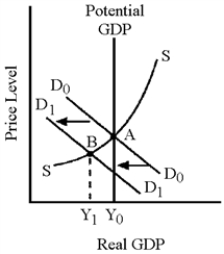Exam 16: Budget Deficits In The Short and Long Run
Exam 1: What Is Economics226 Questions
Exam 2: The Economy Myth and Reality152 Questions
Exam 3: The Fundamental Economic Problem Scarcity and Choice250 Questions
Exam 4: Supply and Demand An Initial Look298 Questions
Exam 5: An Introduction To Macroeconomics215 Questions
Exam 6: The Goals Of Macroeconomic Policy211 Questions
Exam 7: Economic Growth Theory And Policy228 Questions
Exam 8: Aggregate Demand and The Powerful Consumer218 Questions
Exam 9: Demand Side Equilibrium Unemployment Or Inflation 212 Questions
Exam 10: Bringing In The Supply Side Unemployment and Inflation 228 Questions
Exam 11: Managing Aggregate Demand Fiscal Policy209 Questions
Exam 12: Money and The Banking System222 Questions
Exam 13: Monetary Policy Conventional and Unconventional204 Questions
Exam 14: The Financial Crisis and The Great Recession61 Questions
Exam 15: The Debate Over Monetary and Fiscal Policy215 Questions
Exam 16: Budget Deficits In The Short and Long Run210 Questions
Exam 17: The Trade Off Between Inflation and Unemployment219 Questions
Exam 18: International Trade and Comparative Advantage207 Questions
Exam 19: The International Monetary System Order Or Disorder 217 Questions
Exam 20: Exchange Rates and The Macroeconomy209 Questions
Select questions type
Figure 16-2  -The Federal Reserve may choose to monetize the debt in order to
-The Federal Reserve may choose to monetize the debt in order to
(Multiple Choice)
4.9/5  (43)
(43)
Proper inflation accounting is necessary to measure the size of the real deficit because
(Multiple Choice)
4.9/5  (42)
(42)
At levels of GDP above full employment,the federal budget would usually be in a deficit position.
(True/False)
4.7/5  (34)
(34)
The Fed and the government are working against each other if,as the government cuts taxes to promote economic growth,the Fed
(Multiple Choice)
4.7/5  (36)
(36)
In the long run,aggregate demand controls,no matter what happens to aggregate supply.
(True/False)
4.8/5  (44)
(44)
The blame for failing to address the budget deficits of the 1980s and early 1990s
(Multiple Choice)
4.9/5  (45)
(45)
During the late 1980s and early 1990s,most of the budget deficits were accounted for by
(Multiple Choice)
4.7/5  (40)
(40)
If the economy is in an inflationary gap,which of the following is the least appropriate policy mix?
(Multiple Choice)
4.8/5  (33)
(33)
If the government ran a major deficit,and there was no noticeable effect on the level of GDP,this could be taken as evidence of
(Multiple Choice)
4.8/5  (40)
(40)
It is most likely that the federal government will never actually pay off the national debt.
(True/False)
4.7/5  (43)
(43)
A federal budget deficit places a genuine burden on future generations when the
(Multiple Choice)
4.9/5  (39)
(39)
If the inflation rate falls,what will happen to the budget deficit?
(Multiple Choice)
4.9/5  (41)
(41)
Which of the following statements about the national debt has the most validity?
(Multiple Choice)
4.9/5  (32)
(32)
In 2010,which of the following was true regarding the extremely large deficits that the U.S.recently encountered?
(Multiple Choice)
4.7/5  (37)
(37)
The U.S.national debt at the end of 2014 was about $30 trillion.
(True/False)
4.8/5  (34)
(34)
Showing 161 - 180 of 210
Filters
- Essay(0)
- Multiple Choice(0)
- Short Answer(0)
- True False(0)
- Matching(0)